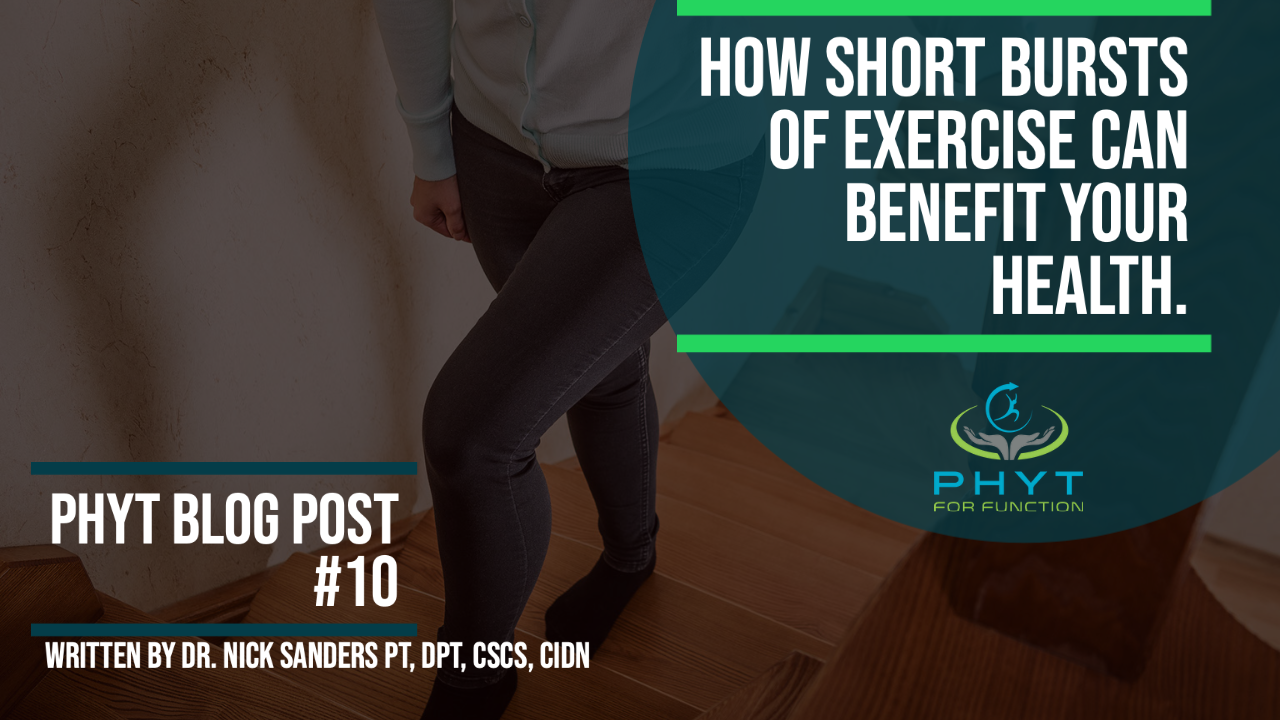How Short Bursts of Exercise Can Benefit Your Health.
Feb 17, 2022
How 3-10 minutes, of moderately intense exercise after meals can improve your health.
Have you ever had that feeling where you knew you weren’t going to be able to make it to the gym so you just said screw it and did nothing? “Been there…”
Little bouts of exercise might not improve your 40m dash time but they add up big time when you are talking metabolic health. In fact, research (1) shows accumulate exercise may be better than continuous exercise at controlling same day glucose levels.
Why is this so important?
We want our bodies to be very sensitive to insulin. Insulin allows the cells to take up glucose from the blood. If our cells are not receptive to insulin your pancreas will have to produce more of it to have the same effect. High levels of insulin have a host of downstream consequences on health. Google the term “metabolic syndrome”. It’s bad news. It is associated with insulin resistance, obesity, type 2 diabetes, and cardiovascular disease (2). We need to figure out how to combat these metabolic changes if we want to improve quality of our heart and brain health, let alone its role in pain, anxiety, and other reproductive diseases.
Why little bouts?
It’s easy to do. It is much easier to find 10 minutes here or there than it is to carve out 90 minutes in a busy schedule. AND IT WORKS.
Small exercise bouts within 30 minutes of glucose uptake have been to shown to reduce post meal glucose levels and insulin resistance. One recent study (3) found that 3 minutes of moderately intense stair walking reduced blood glucose, and 10 minutes improved insulin resistance. That’s HUGE.
Action Plan
Try to find time to accumulate 3-10 minutes of exercise after your meals. That can be as a simple as a brisk walk or doing the stairs. If you eat three times per day that’s 9-30 minutes of exercise accumulated real quick. If you can find time to get another workout that involves some resistance training great. We know that maintaining muscle mass is also very important to improve insulin resistance. Most importantly, though, have the freedom to appreciate little bouts will add up and research shows will improve markers related to heart and brain health!
- Zhang X, Zheng C, Ho RST, Miyashita M, Wong SHS. The Effects of Accumulated Versus Continuous Exercise on Postprandial Glycemia, Insulin, and Triglycerides in Adults with or Without Diabetes: A Systematic Review and Meta-Analysis. Sports Med Open. 2022 Jan 24;8(1):14. doi: 10.1186/s40798-021-00401-y. PMID: 35072806; PMCID: PMC8786998.
2. Bovolini A, Garcia J, Andrade MA, Duarte JA. Metabolic Syndrome Pathophysiology and Predisposing Factors. Int J Sports Med. 2021 Mar;42(3):199-214. doi: 10.1055/a-1263-0898. Epub 2020 Oct 19. PMID: 33075830.
3.Moore J, Bartholomae EM, Ward K, Hooshmand S, Kressler J. Three minutes of moderate-intensity stair walking improves glucose and insulin but not insulin sensitivity or total antioxidant capacity. Nutr Metab Cardiovasc Dis. 2022 Feb;32(2):479-486. doi: 10.1016/j.numecd.2021.10.016. Epub 2021 Oct 29. PMID: 34896000.
Written by Dr. Nicholas Sanders PT, DPT, CSCS, CIDN. Dr. Sanders is the founder and owner of PHYT For Function where we provide a convenient and simple solution for people to continue to do the activities they love without muscle, joint, or nerve pain. He is a national instructor for Integrative Dry Needling and Co-Creator of a Neuro-Inflammatory Manual Therapy course.
Stay connected with news and updates!
Join our mailing list to receive the latest news and updates from our team including a weekly 5 Line Newsletter on health and fitness
Don't worry, your information will not be shared.
We hate SPAM. We will never sell your information, for any reason.

